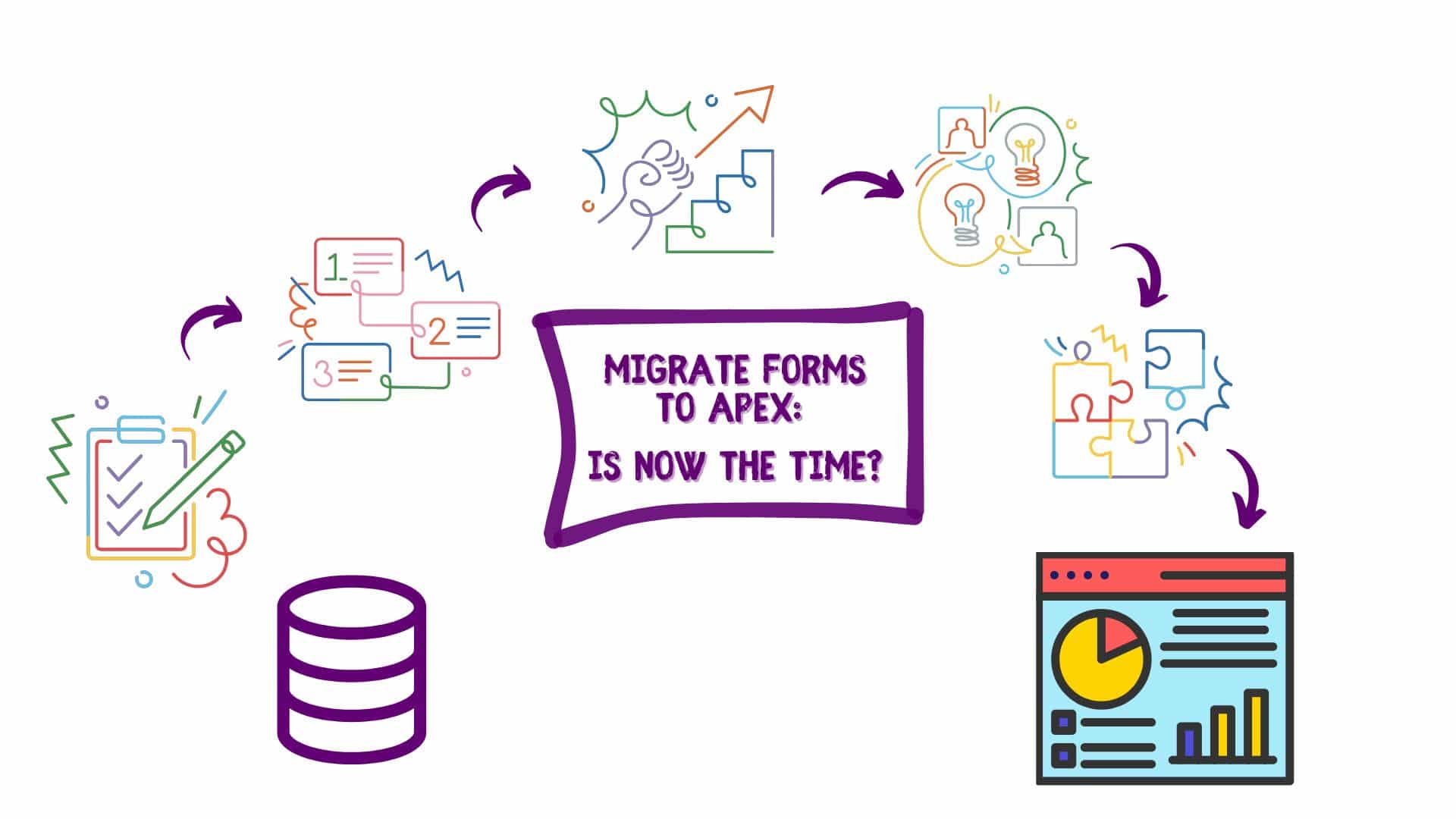Oracle Forms has been used to build enterprise grade applications in an Oracle infrastructure for decades. Forms provides a number of key benefits that allow for rapid development of scalable, efficient, and powerful applications:
- Built in locking functions that automatically employed row-level locks to ensure maximum concurrency allowing the application to scale to a virtual unlimited number of users. There is no need to build your own locking model that could be prone to errors.
- Ability to use SQL and PL/SQL to put code where it logically belonged for maximum performance – in the Form itself or in the database.
- Ability to execute Stored Procedures and Functions seamlessly
- Easy layout builder allowing the development team to design an interface that is both easy to use and accommodated the demands of power users.
- Integration with Oracle Access Manager, communicate with Web Services, work with Microsoft Office tools, run reports from Oracle Reports or BI Publisher, etc.
Given that Oracle continues to support and develop new functionality with Forms, why might you consider migrating?
- Usability: Business users are working on a variety of different devices including desktops, tablets, and mobile devices. Oracle Forms restricts the platforms your users can use to access your application.
- External Access: Oracle Forms is not well suited to customer facing applications. It does require specific browser plug-ins to be installed in order to function properly
- Developer Availability: It is increasingly more difficult to find skilled Oracle Forms developers or to motivate young developers to become Forms developers.
If not Forms, then what?
Realize that any migration to a new platform is not a trivial exercise. In fact, it can be a difficult and time consuming effort. The key to a successful migration is to build upon existing skills and to take advantage of existing code to speed the rebuild effort and to minimize the introduction of new bugs.
Believe it or not, there is an easy answer to this question – Oracle APEX.
Here is how Oracle describes APEX:
Oracle Application Express (APEX) is a low-code development platform that enables you to build scalable, secure enterprise apps, with world-class features, that can be deployed anywhere.
Using APEX, developers can quickly develop and deploy compelling apps that solve real problems and provide immediate value. You won’t need to be an expert in a vast array of technologies to deliver sophisticated solutions. Focus on solving the problem and let APEX take care of the rest.
Why Choose APEX?
- Reuse of Existing Code: All of the underlying stored procedures, functions, and packages being used by the Forms application can be used by the new APEX application. You do not have to rewrite the extensive database resident code that already exists.
- Skill Sets: Oracle Forms and APEX share the same core skill sets and is a natural evolution for any Forms developers. Both use a declarative development model leveraging SQL and PL/SQL.
- Coexistance: Migrate to a new technology framework at your speed. Forms and APEX can run side-by-side against the same database and the same database objects.
- Flexibility: Where you develop your application modules doesn’t limit where you can deploy them.
- Proven Path: Oracle has many customers who have successfully migrated from Forms to Oracle APEX over the years. APEX can handle workgroup applications through to enterprise grade applications.
- Cost: There are no licensing costs associated with developing or running APEX. It is an included feature of your Oracle Database license.
What Migration Approach Makes Sense?
In some ways, deciding how to migrate can be harder than the actual migration itself! There are some specific considerations for your team to ponder:
- Should we start with using APEX to deliver net new functionality and to provide external facing applications to our customers while leaving the core system in Forms?
- Should we identify and migrate key modules first and take a phased approach to upgrading the application system as a whole to the new framework?
- Should we spend time evaluating the entire workflow and design new screens using a new approach or simply replace what currently exists with a newer interface?
The good news is you have plenty of options. The bad news is you have plenty of options.
Your migration challenges will originate from business considerations. Even though migrating from Forms to APEX is the most efficient way to upgrade your application, the approach you take will be determined by ROI calculations specific to your organization. APEX is not going to limit your approach to Forms migration!
Your next steps will include the following:
- Define the scope of your migration project. Are you going to replace specific modules or the entire application? Are you going to take a phased approach to implementation or a full switch over?
- Define the look and feel to ensure you have a standardized user interface across all screens. Focus on process simplification and user friendliness.
- Evaluate your Process Flow. Now is the time to incorporate any changes the business users would like to see related to how the application process flow works. It is likely that the existing Forms application represents the paper flow in use at the time the system was originally developed. This may not be the preferred flow any longer.
- Train Developers: Ensure that your team has the latest skills and understands the Best Practices of APEX development before they begin the migration.
If the value of a technology migration away from Oracle Forms is justified in your organization, Oracle APEX is the most powerful and efficient option available to ensure the success of this process.






